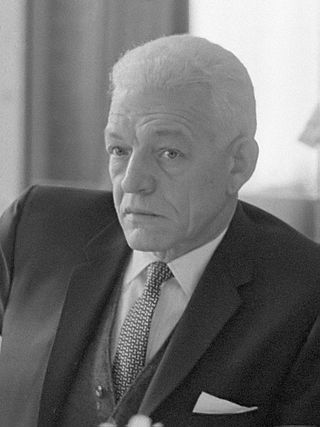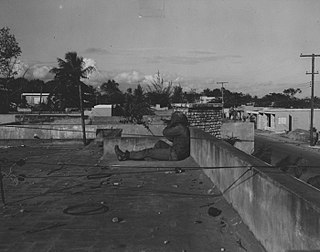A triumvirate or a triarchy is a political institution ruled or dominated by three individuals, known as triumvirs. The arrangement can be formal or informal. Though the three leaders in a triumvirate are notionally equal, the actual distribution of power may vary. The term can also be used to describe a state with three different military leaders who all claim to be the sole leader.

Juan Emilio Bosch y Gaviño was a Dominican politician, historian, writer, essayist, educator, and the first democratically elected president of the Dominican Republic for a brief time in 1963. Previously, he had been the leader of the Dominican opposition in exile to the dictatorial regime of Rafael Trujillo for over 25 years. To this day, he is remembered as an honest politician and regarded as one of the most prominent writers in Dominican literature. He founded both the Dominican Revolutionary Party (PRD) in 1939 and the Dominican Liberation Party (PLD) in 1973.

The president of the Dominican Republic is both the head of state and head of government of the Dominican Republic. The presidential system was established in 1844, following the proclamation of the republic during the Dominican War of Independence. The president of the Dominican Republic is styled Your Excellency, Mr. President during his time in office. His official residence is the National Palace.

The Social Christian Reformist Party is a Christian democratic right-wing political party in the Dominican Republic. It was established on July 24, 1984, by the union of Joaquín Balaguer's Partido Reformista and the Partido Revolucionario Social Cristiano. Some of the PRSC's founders and leaders were originally business leaders and Roman Catholics who opposed the communist, socialist, and social democratic tendencies of Juan Bosch, the Dominican Revolutionary Party (PRD) and the Dominican Liberation Party (PLD).

José Francisco Peña Gómez was a politician from the Dominican Republic. He was the leader of the Dominican Revolutionary Party (PRD), a three-time candidate for president of the Dominican Republic and former Mayor of Santo Domingo. He is considered, along with Joaquín Balaguer and Juan Bosch, as one of the most prominent Dominican political figures of the 20th century.

Col. Francisco Alberto Caamaño Deñó was a Dominican soldier and politician who took the constitutional presidency of the Dominican Republic during the Civil War of 1965. During the war, which began on April 24, 1965, Caamaño was one of the leaders in the movement to restore the democratically elected President Dr. Juan Bosch, who had been overthrown in a military coup d'état in September 1963.
Joseph Donald Reid Cabral was a Dominican politician and lawyer. Reid became president during the "triumvirate" from December 28, 1963 to April 25, 1965.
The Dominican Communist Party was a political party in the Dominican Republic. The party was founded in 1944 under the name Dominican Revolutionary Democratic Party. The party worked under the name Dominican Popular Socialist Party from 1946 to 1965. In August 1965 the name was again changed, to Dominican Communist Party.

The Dominican Civil War, also known as the April Revolution, took place between April 24, 1965, and September 3, 1965, in Santo Domingo, Dominican Republic. It started when civilian and military supporters of the overthrown democratically-elected president Juan Bosch ousted the militarily-installed president Donald Reid Cabral from office. The second coup prompted General Elías Wessin y Wessin to organize elements of the military loyal to President Reid ("loyalists"), initiating an armed campaign against the "constitutionalist" rebels. Allegations of communist support for the rebels led to a United States intervention in the conflict, which later transformed into an Organization of American States occupation of the country by the Inter-American Peace Force. Americans and rebel Dominicans skirmished several times but fought only one battle, which occurred on June 15–16, 1965, in the rebel-held Ciudad Nueva area of the city, where the 82nd Airborne Division lost 5 KIA, 31 WIA, and 3 DOW, while inflicting casualties of 67 KIA and 165 WIA on the rebels. Elections were held in 1966, in the aftermath of which Joaquín Balaguer was elected into the presidential seat. Later in the same year, foreign troops departed from the country. The conflict resulted in around 6,000 Dominican casualties and 350 U.S. casualties.
Elías Wessin y Wessin was a Dominican politician and Dominican Air Force general. Wessin led the military coup which ousted the government of Dominican President Juan Bosch in 1963, replacing it with a triumvirate. Wessin was also a key figure in the ensuing Dominican Civil War, which led to a United States military intervention into and occupation of the Dominican Republic in 1965.
Ramón Tapia Espinal was a lawyer and political figure from the Dominican Republic. He served as Secretary of Industry and Commerce and Secretary of State, for President, Rafael Bonnelly, during the Council of State (1961-1963) which succeeded the overthrow of the dictator Rafael Leónidas Trujillo in 1961.
The following lists events that happened during 1965 in the Dominican Republic.

The participation of the United States in regime change in Latin America involved US-backed coup d'états which were aimed at replacing left-wing leaders with right-wing leaders, military juntas, or authoritarian regimes. Intervention of an economic and military variety was prevalent during the Cold War. Although originally in line with the Truman Doctrine of containment, United States involvement in regime change increased following the drafting of NSC 68, which advocated more aggressive actions against potential Soviet allies.

Carmen Quidiello Castillo was a Cuban-born Dominican poet, playwright and social activist. Quidiello served as First Lady of the Dominican Republic in 1963 during the short tenure of her husband, former President and Dominican Liberation Party (PLD) founder, Juan Bosch.
The 1963 Dominican coup d'état was a coup d'état that took place on 25 September 1963 against President Juan Bosch in the Dominican Republic. Juan Bosch had been the first democratically elected president after the assassination of the former dictator Rafael Trujillo but his policies faced criticism within from due to his policies, which were seen as leftist, which led to the coup that replaced his government with a military junta which itself would be replaced with a civilian junta.
María Paula Acevedo Guzmán, known as Chichita and Chichita Caamaño, was a Dominican activist and First Lady of the Dominican Republic from May 4, 1965, to August 30, 1965. Acevedo was the wife of Colonel Francisco Caamaño, who became the constitutional President of the Dominican Republic during the Dominican Civil War of 1965. Caamaño was one of the leaders of the movement to restore the democratically elected former president, Juan Bosch, who had been overthrown in a military coup d'état in September 1963.

The Mission of the Representative of the Secretary-General in the Dominican Republic (DOMREP) was a peacekeeping operation established in 1965 by the UN to observe the ceasefire agreement between the two de facto authorities in the Dominican Republic during the Dominican Civil War. DOMREP was instructed to report any breaches of the agreements between the Constitutionalists led by Juan Bosch and Francisco Caamaño, and Loyalists commanded by Elías Wessin y Wessin and backed by the United States. Once the new Dominican constitutional government was formed, DOMREP withdrew.

The Dominican Provisional Government Junta was a day-long military junta established after the coup that overthrew the democratically elected Juan Bosch on September 25, 1963. Headed by General Imbert Barrera, Luis Amiamo Tio, & Victor Elby Vinas Roman it called the leader of 6 right-leaning parties to come together and help form government in the wake of the coup leading to the Triumvirate of 1963.

The Triumvirate of 1963 was a short-lived three man civilian junta that controlled the Dominican Republic after the 1963 Dominican Coup d'état. After deposing the democratically elected president Juan Bosch the military established a three-man military junta headed by General Imbert Barrera, Luis Amiamo Tio & Victor Elby Vinas Roman but was forced to create the civilian junta after international & domestic pressure.











